Opium, Logging and Gas: the Burma Army’s predatory rule over the people of Burma
17 March 2014 Kachin State, BurmaDear friends,
We have just returned from a series of relief missions to the Kachin and Shan States. There the Burma Army continues its attacks on ethnic minorities. Please see our reports and video of these attacks at www.freeburmarangers.org . The Burma Army also over-watches opium production and logging, and protects a gas pipeline that profits them but few others. This report will be the first in a three-part series that documents the Burma Army’s predatory rule of this part of Burma. Part one is “Opium, Burma Army-controlled narcotic militias and real people,” part two is “Attacks on the people and logging” and part three is “The Shwe Pipeline and the oppression of the people.”
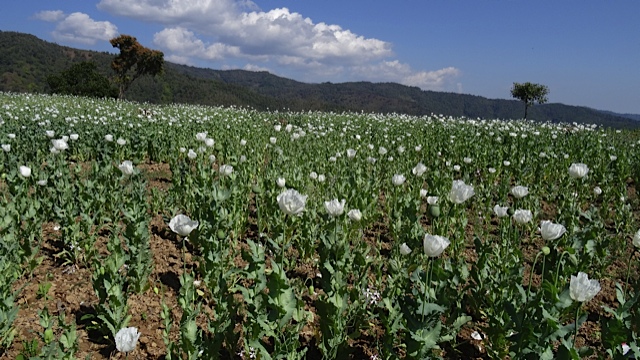
Part 1: Opium, Burma Army-controlled narcotic militias and farmers
After conducting medical and Good Life Club (GLC) programs and documenting the Burma Army attacks in southern Kachin State, we moved to northern Shan State to work with the Ta’ang, Shan, and Kachin people there. On this mission Arakan, Kachin, Karen, Karenni, Shan and Ta’ang FBR team members served the IDPs and villagers we met.
After conducting more programs with the Ta’ang people in northern Shan State, we moved to an area of opium production. We were accompanied by elements of the Ta’ang National Liberation Army (TNLA), the Kachin Independence Army (KIA) and the Shan State Army North (SSA-N). These groups are united in their struggle for freedom in Shan State and all of Burma. They also have a policy to eradicate all narcotics. We went to the Pang Say area of Nam Kham Township, northern Shan State. Here there were opium fields around every village that we encountered. The Chinese families producing the opium are uniformly poor and some wretchedly so. Most are living in dilapidated shacks of wood, thatch, stone and tattered plastic sheeting. They are all under the control of the Burma Army-supported People Militia Force (Bi Thu Sit or Ta Ka Sa Pha in Burmese). The militia is led by an ethnic Chinese man named Kyaw Myint, who is also a member of Parliament representing Namkham No.2 constituency for the Burma government-backed Union Solidarity and Development Party (USDP). Namkham is situated on the China-Burma border close to the Muse-Riuli crossing.
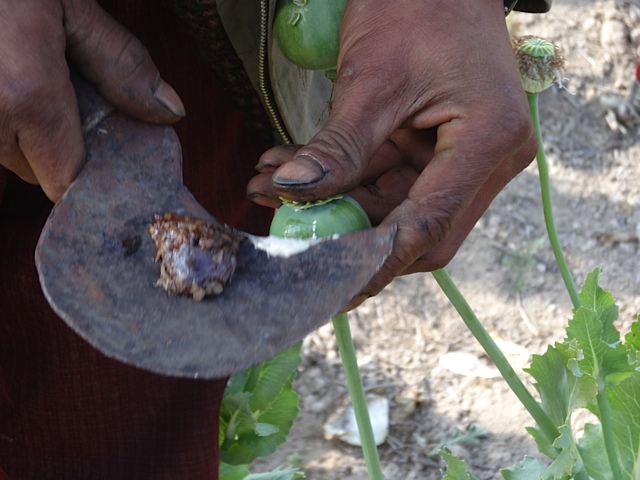
Northern Shan State, Burma.
Personal Experience with Opium families
The Ta’ang resistance has an anti-narcotics education program and every Ta’ang village we visited had a large vinyl poster educating people on the evils of narcotics and the policy of the Ta’ang against it. They have a program to educate, provide subsidies and crop substitutions and to conduct enforcement. As we prepared to go, the local leaders told us that the Ta’ang Army was planning to start destroying all the opium fields in the area later this month. We planned to document that too, if it happened while we were there.
We started the movement into the opium area and by the second day began to see opium fields. We stopped at the first large field and began to take photographs. We had only been there 20-30 minutes before we were told that the Burma Army in a camp to the north had word we were there and were coming to attack us. We finished our documentation and moved on deeper into the opium growing area with a rear guard watching for the Burma Army.
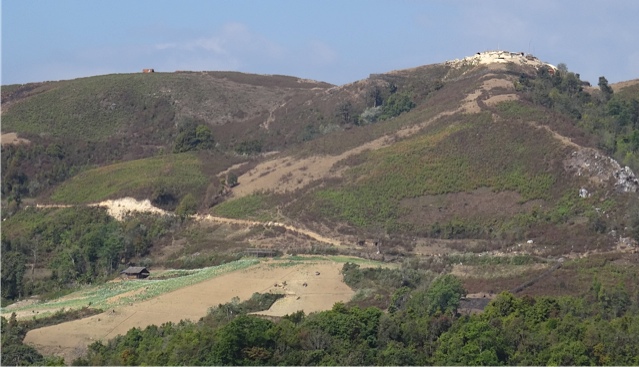
We climbed up to over 5,000 feet and entered into a high valley with opium fields and houses scattered on the hillsides. On top of a small hill in the center of the valley was a village of about 10 houses, and in the middle of the village stood a larger stone-and wood house. Opium fields came right up to the house. The combined Kachin (KIA), Ta’ang (TNLA) and Shan (SSA-N) troops set up a security perimeter around the village and we began to document the opium fields. As we approached the stone house on the hill, the Chinese family there looked at us fearfully. I looked back at them and smiled as I took photos of the opium all around their house, the house itself and the 4-wheel drive jeep parked in front. This was the only vehicle we had seen at any farm and signified that this family had connections and more resources than most. Still, to me they looked very poor. I felt pity, mixed with dislike of their chosen profession. I took photos, investigated the property and made notes.
After about an hour of taking photos and gathering information, the leader of this part of the mission said we would stay here one night and the next day go to do a reconnaissance of the nearby militia camp. To our surprise we were told we would be sleeping in the house of the family with the jeep – the same family I had spent time documenting and had looked down on. “We have control right now, and unless the militia or Burma Army comes we will sleep here,” our local Ta’ang leader told us. “We have told the people here to stop growing opium and we are trying to help them find other ways. Still they do not listen and keep growing the opium. At some point if they do not stop, our Ta’ang troops will destroy it. But for now we just document it.”
I felt awkward as we entered the house of the opium growers but we smiled and in limited Chinese thanked them for their hospitality. My wife led the way in establishing friendship and was soon sitting around the fire with the women of the house. As she shared with smiles and hand signals and then later through one of our team who could speak Chinese, the family began to warm up and became very friendly towards us. On my part, I began to like them and by that night felt warm and close. Opium farmers are still people and I was finding that out. It was not a simple, “good guy-bad guy” situation. We told them we were here to find out about the situation and they did not need to be afraid of us. Our local Ta’ang leader told them the same. We all knew the Ta’ang had a plan announced to destroy the fields but did not know when that would happen. For now we were becoming friends.
The next morning we took some of the teams and climbed up toward the Militia camp. The camp squatted on a mountaintop that over-watched all the land below it. It can be seen from miles in each direction and it reminded me of a feudal fortress dominating all below. “It looks like Mordor,” said one of our team members. It did. A bare, tree-stripped, scared, fortified mountaintop stronghold, ruled with bad purpose, subjugating the people below it. Opium fields were arrayed below the camp coming up the mountain to within a few hundred yards of the outside fence.
We approached the camp carefully and spent most of the day filming and photographing the camp and the soldiers in it. The new flag of Burma, yellow, green and red with a white star, was on the flag pole. The militia troops were in dark green uniform similar to Burma Army uniforms. After gathering all the documentation we could, we started the walk back to the village we had come from.
When we arrived we were greeted with smiles by the family we stayed with. They, my family and the teams that had stayed back had become closer. This good feeling was interrupted when a new column of Ta’ang troops came into the village. They were from headquarters and were on orders to begin the destruction of the poppies today. We were all surprised and I said, “Yes, it is good to destroy the fields but please not now. We have been taken into these people’s homes, and they have shared their food with us. We told them they did not need to be afraid of us. They knew they needed to do something different but please give them more time. If the destruction starts now, with no other kind of help, they will feel like we betrayed them.”
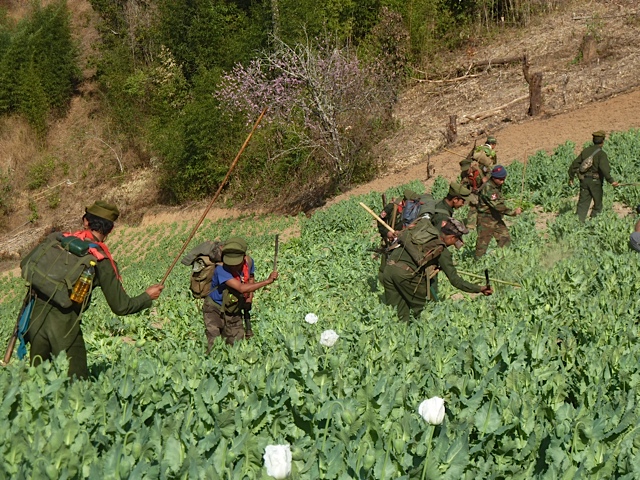
Our kids ran up to me and said, “No, no they should not destroy these fields. These people are our friends!” The situation of us defending opium growers was new to me and seemed ludicrous. But in a flash it showed me how complicated this all was. Here were people trying to survive. They had chosen a bad way to do it, and we were against it and had told them that. At the same time they had been kind to us and we had enjoyed each other’s company. We had told them they did not need to fear us, that, yes, we were all against narcotics production but the FBR was here to gather information. These were poor people and not evil drug lords. In over 20 years of our work in Burma I have never seen a rich opium farmer – they are poor and desperate people scratching a living out of bare, deforested mountains. Here the militia, the Burma Army and the drug cartels can get rich but not these farmers. They were not innocent but they were also not evil. And they were now our friends. I thought back to last night when my wife sat with the family and shared the gospel story of how much God loved all of us and sent Jesus to help us. We had prayed with this family and we loved them.
As I was thinking these things, the Ta’ang army was advancing through the fields and knocking the poppies off the stalks with sticks. I prayed about what I should do. We agreed with the Ta’ang anti-drug policy, they are our friends and teammates and earlier we had hoped to document the destruction of poppies. At the same time, here were people in trouble. What can we do? “Comfort them and give them love,” was the answer I felt. I looked up and saw the woman of the house burst into tears and run away. Her daughter followed her sobbing. “Why why, why now, we are not ready, I have lost everything, how will we eat, how will we feed our family?” she cried. I went up to her and held her hand, telling her I was sorry and that we would help some way. Her brother looked at me stone-faced and walked away. We gathered around the mother and daughter and tried to comfort them.
My children had tears running down their faces and said, “We know opium is wrong but why now, why didn’t they have more time, these are our friends, what can we do?”
I prayed with the mother and through one of our Kachin team members told her that God had a way for her. She could ask God what to do, and God would show a new way. She wept as she answered me, “How will we eat and most of all how will we get my son out of prison? He is being held by the Burma Army and they have demanded $100 to get him released.” I asked our team if this was a true story and they said it was. “How can we save him, now all our way to make money is gone?” she cried.
I told the woman. “I will give you money for what you lost. Not because I think opium growing is right. I do not. It is wrong and our Ta’ang friends are right to destroy it. But we said that you did not need to fear us and we became friends with you and now this has happened. I am giving this money to help you set your son free, for food for your family and to encourage you to find another way. God will help you do that if you call on Him.” I gave her $230 which is about what she could have got with her crop. I explained why I did this to the Ta’ang leaders and soldiers and they all agreed it was okay.
The mother stopped crying and thanked us, saying, “I have nothing to give you but I will never forget this, thank you so much for this help.” My wife sat with her a long time encouraging her that this was an opportunity to make a new start and praying with her.
As we left to go to the next area I thought about this incident and it came to me that if you want to stop people from growing opium, loving them is the most important thing. For me, I see a five-part policy is needed:
- Education
- Crop substitution
- Food subsidies until the crops substitutes take effect
- Enforcement and punishment
- Love. To treat all people with love through each of the parts of a counter-narcotics policy will take longer but it is the moral way and will have the best, most long-term effect.
Interviews with Opium Farmers
While in this village we interviewed some of the opium farmers. Most of the people here were too afraid to answer questions about opium. A few, however, were willing to talk and here is what we learned.
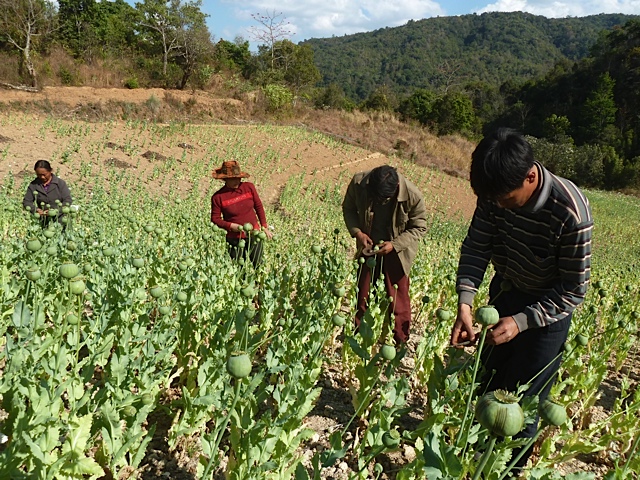
A. Opium is the main thing in this area. Here rice does not grow well and so opium is the way we know to grow for money. We buy rice from other villages. Note: Some here said they have been growing opium for 5-6 years while others said over 16 years.
Q. How is production?
A. Opium production is up and down depending on the rains. We try to harvest during February and March before the rains. During the rainy season we can’t harvest because it washes away the opium residue on the bulbs. During harvest time they we do 4-5 harvests a month.
A. The Burma Army’s militia has control here. They are a Chinese militia under Kyaw Myint, who work under the Burma Army and they control the opium.
The opium plant flowers, then the petals fall away and the bulb ripens. Opium is then harvested from the bulb. A multi-bladed scoring tool is used to score the bulb, usually twice on one side, making six scores. The raw opium oozes from the bulb scores and is then twice-scraped from the bulb with a short, wide, curve-bladed knife. The opium oozes out white, and is gathered on the wide knife where it turns brown. One bulb can be harvested from four to five times a month for about two months a year. It is sold by the viss for 600,000 -700,000 kyat per viss ($600-$700). One viss is about 2.5kg.
Burma Army controlled narcotic militias
The Burma army controls and supports the People Militia Force (Bi Thu Sit or Ta Ka Sa Pha in Burmese). The militia is led by Kyaw Myint who is a ethnic Chinese but who is a Burma citizen and a member of parliament. Second-in-command of the militia is his younger brother, Kyaw Htwe. Two other brothers, Jang Kwey Ching and Jang Lu, are next in the chain of command of the militia and they also have the duty of overseeing the illegal logging in this area. The militia is headquartered in Pang Say town, Nam Kham Township, and has camps in three other locations south of Pang Say along mountain range that rises over 6000 feet high. The militia is also co-located with Burma Army troops in Mong Wi Village in the Mong Wi valley southeast of Pang Say. The Shwey gas pipeline runs through this town and valley on its way from offshore Arakan State in southwest Burma to China.
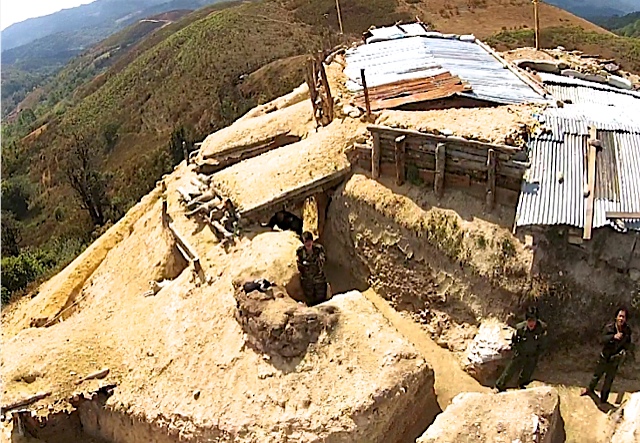
Opium production in the past few years has increased in the Namkham area of northern Shan State and this is directly related to Kyaw Myint and his Burma Army-supported militia. (From “Still Poisoned ,” a report by the Palaung Women’s Organization (PWO). According to this report, in the 2010-11 season, 1,109 hectares (about 4 ½ square miles) of land in 15 villages were now being used for opium cultivation, as opposed to 617 hectares two years ago in the same 15 villages. On this mission we saw eight of these villages and there were opium fields around each of them right up to the houses. According to another report by the Shan Herald Agency for News (SHAN), the United Nations Office on Drugs and Crime (UNODC) documented that Shan State accounts for over 90% of the opium production in Burma and that in 2010 the total area under opium poppy cultivation across Shan State increased by 20% from the year before. Also in this report, the UNODC reported that Burma’s share of world opium production had increased from five percent in 2007 to 12 % in 2011. Opium farmers pay taxes of up to 8,000 kyat (US $10) per day to the militia. Some say they pay only a once a year tax of 10,000 kyat or more. The militia also controls methamphetamine trafficking and in this area a pill costs between 2,500 kyat- 3,000 kyat ($3.00- $4.00). The most common is the WY brand.
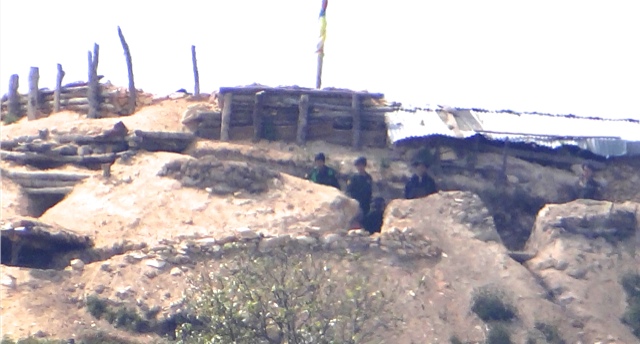
Conclusion
“Let my people go,” has been on my mind and heart for Burma. Whether the issue is opium, gas pipelines, logging or outright attacks, there is a way through this. For me it means listening to God and repenting of my own sins. It means asking God how to stand with the oppressed and against oppression of all kinds. It means praying for our enemies and trying to be friends. Everyone counts and together we can find a way forward – the Burmans and ethnic groups, the Burma Army and the pro-democracy movement, business and the welfare of all people. Burma is big enough for everyone. Love should be the center of any solution and is the way to find the balance between freedom and responsibility, conservation and progress, justice and mercy. Our prayer is that God will lead us to better understand and help each other work towards reconciliation for all people in Burma. Thank you for helping us do that.
God bless you and love,
Free Burma Rangers
